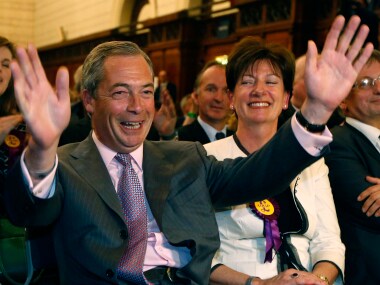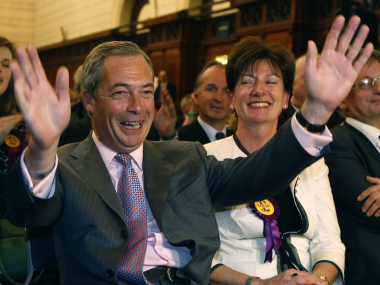Those British voters who slept in this morning could wake up to the news that the majority voted in favour of leaving the
European Union
. The EU has a good track record of making its member countries repeat referenda (such as in the case of
Denmark and Ireland
) or just plainly ignoring them (such as in the
case of Greece
). It is unlikely that the EU can do the same now. Its second strongest national economy (after Germany) — or now that the pound and stocks are in a freefall, so possibly the third strongest (after Germany and France) — wants out. Beside the turmoil in
financial markets
and the plunge of the
British pound
, one of the most notable and immediate consequences of this decision is the resignation of
David Cameron
. At first glance, it appears that Britain is expressing what many other voters all over Europe have been expressing for years: the rhetoric and reasoning centered on immigration seem to have won the hearts of the majority of those interested in voting. The UK Independence Party (Ukip) has been at the forefront of the anti-immigration sentiment in Britain for years, and despite the relatively bad results at the
most recent general elections
, they are the ones to
celebrate the most
. Ukip has been compared to other xenophobic and anti-immigrant
far-right parties in Europe
: Freedom Party in Austria, the National Front in France (whose leader expressed her
happiness with the result
), Fidesz and Jobbik in Hungary, Law and Justice in Poland, and others. But is the referendum result a sign of an upsurge in the support for Ukip? Probably not. Just a year ago, Ukip won a total of 3.88 million votes. The support for ‘Leave’ on Thursday came from 17.41 million voters. [caption id=“attachment_1542299” align=“alignleft” width=“380”]
 Nigel Farage, leader of Ukip. Reuters[/caption] The difference partly came from voters who had supported other parties a year before. Many MPs from both parties were vigorously campaigning for Britain to stay in the EU. So how come there was such a stark difference? There are many possible interpretations and most of them will probably be focussed on the anti-immigration debate and xenophobia. But there are other possible explanations for this result and other political responses that could capture the potential of this situation. It is not easy to account for the
complexity of the results
: Scotland and North Ireland are dominantly in favour of ‘Remain’ while England and Wales are in favour of Leave. The North Ireland and Scotland results may partly be accounted for by the specific political dynamic in these countries. England and Wales, however, reveal a different story. The first impression is that some of the Labour strongholds partly voted ‘Remain’ (including London), whereas most of the Tory strongholds voted ‘Leave’. But the deeper regional divisions within England seem to be much more important: big and prosperous cities with universities on the one hand, and the
rest of the country on the other
. The Left Leave Campaign (#Lexit) interpreted this dynamic as “a rejection of the entire political establishment by millions of working class people, who have been left to suffer austerity for decades with few defenders among the
mainstream parties
”. Britain has been facing a housing crisis with
soaring rent prices
, a concerted attack on the spending by the
National Health Service
, and the lack of affordable
higher education
. All of those issues were negatively impacted by the austerity measures imposed by the current Chancellor of the Exchequer,
George Osborne
. Even some mainstream politicians, such as Green MP Caroline Lucas, described the results as a “sense of just having been un-heard, un-listened to for
so many years
”. This seems to be a nod to the other leftist answers’ to the protracted political and economic crisis in the EU. Alternative visions of the EU are taking shape; focussing on populist issues of anti-corruption, anti-globalism, Euroscepticism and environmentalism. They are still not dominant, but luckily the right wing xenophobic parties are not dominant either. The EU is entering uncharted territory. Under Article 50 of the Lisbon Treaty, the negotiations
may last up to two years
. It is likely that Brexit will hurt many people economically: the inflation may be higher, mortgage costs may increase, the price of houses may not grow as fast, benefit payments may be lower,
taxes may rise, etc
. Labour’s Diane Abbott pointed out that the problems the country is facing are systemic and that the “politics of the Conservative Party, now more than ever influenced by the phenomenon of Ukip and Britain First, have no future; nor do the managerial,
disconnected politics of New Labour
.” In the short term, it is to be expected that the politics of the right will continue. However, Brexit also creates openings for other responses that can try to “offer working people genuine control over their lives, workplaces and communities”. It is anyone’s guess who will manage to shape the debate in the future, in both the European Union and the United Kingdom. The author is pursuing a doctoral degree in anthropology at the University of Pittsburgh on the topic of economic and political issues on the fringes of the European Union.
Nigel Farage, leader of Ukip. Reuters[/caption] The difference partly came from voters who had supported other parties a year before. Many MPs from both parties were vigorously campaigning for Britain to stay in the EU. So how come there was such a stark difference? There are many possible interpretations and most of them will probably be focussed on the anti-immigration debate and xenophobia. But there are other possible explanations for this result and other political responses that could capture the potential of this situation. It is not easy to account for the
complexity of the results
: Scotland and North Ireland are dominantly in favour of ‘Remain’ while England and Wales are in favour of Leave. The North Ireland and Scotland results may partly be accounted for by the specific political dynamic in these countries. England and Wales, however, reveal a different story. The first impression is that some of the Labour strongholds partly voted ‘Remain’ (including London), whereas most of the Tory strongholds voted ‘Leave’. But the deeper regional divisions within England seem to be much more important: big and prosperous cities with universities on the one hand, and the
rest of the country on the other
. The Left Leave Campaign (#Lexit) interpreted this dynamic as “a rejection of the entire political establishment by millions of working class people, who have been left to suffer austerity for decades with few defenders among the
mainstream parties
”. Britain has been facing a housing crisis with
soaring rent prices
, a concerted attack on the spending by the
National Health Service
, and the lack of affordable
higher education
. All of those issues were negatively impacted by the austerity measures imposed by the current Chancellor of the Exchequer,
George Osborne
. Even some mainstream politicians, such as Green MP Caroline Lucas, described the results as a “sense of just having been un-heard, un-listened to for
so many years
”. This seems to be a nod to the other leftist answers’ to the protracted political and economic crisis in the EU. Alternative visions of the EU are taking shape; focussing on populist issues of anti-corruption, anti-globalism, Euroscepticism and environmentalism. They are still not dominant, but luckily the right wing xenophobic parties are not dominant either. The EU is entering uncharted territory. Under Article 50 of the Lisbon Treaty, the negotiations
may last up to two years
. It is likely that Brexit will hurt many people economically: the inflation may be higher, mortgage costs may increase, the price of houses may not grow as fast, benefit payments may be lower,
taxes may rise, etc
. Labour’s Diane Abbott pointed out that the problems the country is facing are systemic and that the “politics of the Conservative Party, now more than ever influenced by the phenomenon of Ukip and Britain First, have no future; nor do the managerial,
disconnected politics of New Labour
.” In the short term, it is to be expected that the politics of the right will continue. However, Brexit also creates openings for other responses that can try to “offer working people genuine control over their lives, workplaces and communities”. It is anyone’s guess who will manage to shape the debate in the future, in both the European Union and the United Kingdom. The author is pursuing a doctoral degree in anthropology at the University of Pittsburgh on the topic of economic and political issues on the fringes of the European Union.
Brexit: Xenophobic parties not dominant but their politics will go on
Ognjen Kojanić
• June 25, 2016, 07:56:42 IST
In the short term, it is to be expected that the politics of the right will continue. However, Brexit also creates openings for other responses that can try to “offer working people genuine control over their lives, workplaces and communities”.
Advertisement
)
End of Article